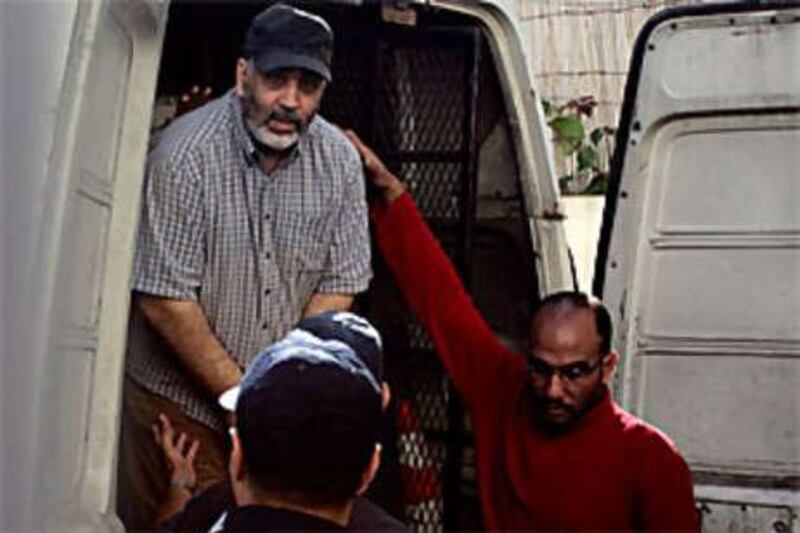RABAT // The trial resumes on Friday of Abdelkader Belliraj, 51, accused of having links to al Qa'eda and masterminding a plot to commit a string of political assassinations in Morocco. Mr Belliraj's alleged gang is one of many rounded up by Moroccan police this year in anti-terrorist sweeps, which authorities said have dismantled more than 50 cells and arrested about 3,000 people since suicide bombings struck the commercial capital, Casablanca, in 2003. About 1,000 terrorist suspects are behind bars.
Critics have said that Moroccan authorities exaggerate the country's terrorist threat to win western support. But suicide bombings in recent years suggest that Morocco showcases the latest generation in al Qa'eda-inspired militancy - diffuse, decentralised, with local agendas but global relevance. Morocco's anti-terrorism campaign kicked off after the 2003 Casablanca bombings. Authorities initially shied from citing al Qa'eda. But this year the government has accused Mr Belliraj and other suspects of ties to the group.
"Al Qa'eda has decentralised and shown a remarkable capacity to adapt," said Fernando Reinares, the director of the Programme on Global Terrorism at the Real Instituto Elcano in Madrid. After the September 11 attacks, the US-led assault on Afghanistan dislodged al Qa'eda and cost it in numbers, Mr Reinares said. The organisation has since adopted regional affiliates and relied on inspiring semi-autonomous cells to destabilise pro-Western countries like Morocco.
In Sept 2006, al Qa'eda leaders deputised Algeria's Salafist Group for Call and Combat, which has battled government forces since the late 1990s, to co-ordinate North Africa fighters as the rebranded al Qae'da in the Islamic Maghreb, a name it assumed the following January. Zawahiri's rising prominence illustrates al Qa'eda's evolution, said Jean-Charles Brisard, a French security consultant and specialist on the financing of terrorism.
"Bin Laden's role is diminishing," he said. "Al Qa'eda is increasingly an ideological force." Al Qa'eda leaders are now having to rely on inspiring semi-autonomous cells in such countries as Morocco, Mr Reinares said. Analysts have speculated about Moroccan militants' international links. But authorities are justifiably concerned, Mr Brisard said. "Morocco is facing groups who get their inspiration, and sometimes their means of operation, from al Qa'eda."
Authorities are tracking down Moroccans in western Europe, the source of much of the funding for North African militancy comes, analysts say. Last month, Spanish authorities offered up Hassan el Haski, a Moroccan jailed for his part in the 2004 Madrid train bombings, to face charges in Morocco of involvement in the 2003 Casablanca attacks. Mr Belliraj, a dual Belgian-Moroccan citizen, was arrested in February while visiting Morocco from Belgium, where he lived.
While Mr Belliraj came from a comfortable background, most terrorist suspects are young men from poor families who shuffle into their trials wearing the robes, sandals, and beards favoured by Sunni Islam's traditionalist Salafi movement. "Most Salafis aren't political and don't have recourse to violence," said Abderrahim Mouhtad, president of an Naseer, a Casablanca-based, non-governmental organisation campaigning for humane treatment of terrorist suspects. "But a minority seeks to combat the regime and forge ties with foreign militants. There are even people who have contact with al Qa'eda."
Most of Morocco's suicide bombers have sprung from the slums, where destitute young men seek dignity in conservative Islam that can turn violent. Some have done time on terrorism charges, and leave prison with tattered reputations that make finding work even harder. Morocco's recently surging economy has missed such shantytowns as Douar Skouila, home to several young men who blew themselves up in Casablanca last year.
A warren of breeze-block houses stands on a hill beside the motorway, with muddy water trickling down the alleys and lines of washing strung overhead. Here and there houses have been demolished and plundered for bricks, leaving gaps like bomb damage. "Just look at the misery here, and the problem explains itself," said Hadi, 25, who lives two doors down from the house of Abdelfettah Raydi, one of last year's suicide bombers, and did not wish to give his surname. Some people here still think that terrorism is the answer."
But not Hadi, who said his dream is simply to leave Morocco. "For me, Islam is a religion of tolerance," he said. "That's why one must not do what these people have done." jthorne@thenational.ae





